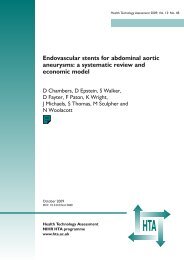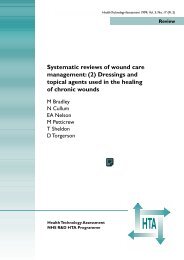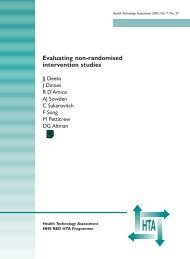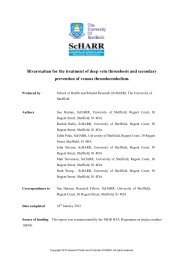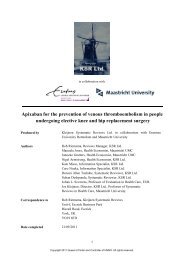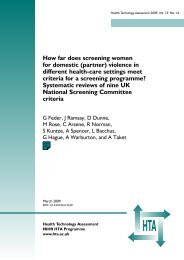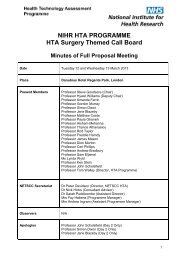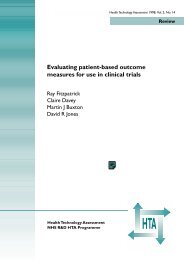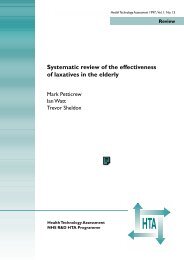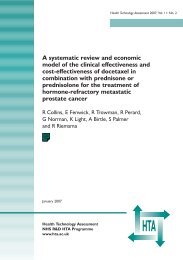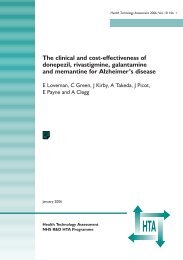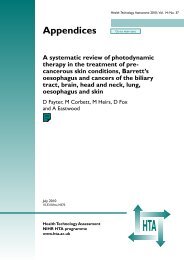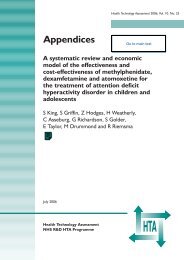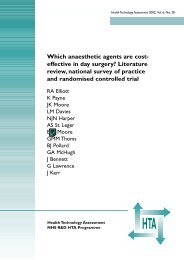A systematic review and economic model of the effectiveness and ...
A systematic review and economic model of the effectiveness and ...
A systematic review and economic model of the effectiveness and ...
You also want an ePaper? Increase the reach of your titles
YUMPU automatically turns print PDFs into web optimized ePapers that Google loves.
assessed by parents <strong>and</strong> teachers. In this study, <strong>the</strong><br />
non-drug intervention involved a behavioural<br />
programme incorporating parent training, teacher<br />
consultation <strong>and</strong> a point system. They observed<br />
significant differences in favour <strong>of</strong> <strong>the</strong> MPH plus<br />
non-drug intervention group (p < 0.001 for both<br />
parent <strong>and</strong> teacher ratings).<br />
Adverse events<br />
Of <strong>the</strong> 11 trials, six contributed data to <strong>the</strong><br />
analysis <strong>of</strong> adverse events. Pelham 81 examined <strong>the</strong><br />
tolerability <strong>of</strong> two medium doses <strong>of</strong> MPH, 0.75<br />
<strong>and</strong> 0.90 mg/kg/day. No significant differences in<br />
<strong>the</strong> incidence <strong>of</strong> headache, 80–82,88 stomach<br />
ache 80–82,88 or insomnia 77,78,80–82,88 were detected<br />
between treatment phases in any trial reporting<br />
<strong>the</strong>se outcomes. Participants in <strong>the</strong> Pelham 82 trial<br />
displayed significantly reduced appetite in <strong>the</strong><br />
MPH treatment phase compared with <strong>the</strong> placebo<br />
phase (RR = 5.67; 95% CI 1.74 to 18.48). None <strong>of</strong><br />
<strong>the</strong> o<strong>the</strong>r three trials 80,81,88 reporting this outcome<br />
detected differences in incidence. No study<br />
reported data on weight.<br />
Summary<br />
MPH plus non-drug interventions (one-to-one<br />
reading <strong>the</strong>rapy, parent training <strong>and</strong> cognitive<br />
<strong>the</strong>rapy) were found to be better than <strong>the</strong> nondrug<br />
intervention alone. None <strong>of</strong> <strong>the</strong> studies in<br />
this category evaluated CGI as a core outcome.<br />
No significant differences in <strong>the</strong> incidence <strong>of</strong><br />
headache, stomach ache or insomnia were<br />
reported between treatment groups, although one<br />
study reported significantly reduced appetite in<br />
<strong>the</strong> MPH group. Overall, <strong>the</strong>se studies did not<br />
score very well in <strong>the</strong> quality assessment, <strong>and</strong> any<br />
results should be interpreted with caution.<br />
MPH high dose (>30 mg/day) plus non-drug<br />
intervention versus non-drug intervention<br />
Seven trials (presented in eight papers) evaluated<br />
high-dose (>30 mg/day) immediate-release MPH<br />
plus non-drug intervention compared with a nondrug<br />
intervention (Table 26; with additional<br />
information in Appendix 12). All <strong>of</strong> <strong>the</strong>se studies<br />
examined MPH administered two or more times<br />
daily.<br />
The majority <strong>of</strong> studies in this category did not<br />
assess hyperactivity, but examined<br />
inattention/overactivity using a Conners’ scale as a<br />
main outcome measure. 69,79,80,88 The results <strong>of</strong><br />
comparisons between treatment groups were not<br />
clearly presented in most <strong>of</strong> <strong>the</strong>se studies.<br />
Hyperactivity<br />
Three <strong>of</strong> <strong>the</strong> studies reported results on<br />
hyperactivity, 51,65,86 but one <strong>of</strong> <strong>the</strong>m presented<br />
© Queen’s Printer <strong>and</strong> Controller <strong>of</strong> HMSO 2006. All rights reserved.<br />
Health Technology Assessment 2006; Vol. 10: No. 23<br />
data in graphs only <strong>and</strong> was not included in<br />
Table 27. 51 The remaining two studies both<br />
assessed hyperactivity using Conners’ scales <strong>and</strong><br />
also o<strong>the</strong>r measures. In Schachar <strong>and</strong> colleagues’<br />
study, 86 <strong>the</strong> non-drug intervention was parent<br />
training or support, <strong>and</strong> in <strong>the</strong> Klein <strong>and</strong><br />
Abik<strong>of</strong>f 65 study, <strong>the</strong> non-drug intervention<br />
involved parent <strong>and</strong> teacher education. These<br />
parallel studies both reported significant<br />
differences in favour <strong>of</strong> MPH plus non-drug<br />
intervention compared with non-drug intervention<br />
when assessed by teachers, but not when assessed<br />
by parents.<br />
Quality <strong>of</strong> life<br />
Elia <strong>and</strong> colleagues 51 assessed CGI as assessed by<br />
physicians. They reported that children receiving<br />
MPH plus a behaviour modification programme<br />
<strong>and</strong> a low monoamine diet had better behaviour<br />
than children in <strong>the</strong> non-drug intervention group<br />
(p < 0.05). In addition, Klein <strong>and</strong> Abik<strong>of</strong>f 65<br />
evaluated Clinical Global Improvement as assessed<br />
by teachers, mo<strong>the</strong>rs <strong>and</strong> psychiatrists. After<br />
8 weeks <strong>of</strong> treatment, <strong>the</strong> physicians rated 97% <strong>of</strong><br />
children in <strong>the</strong> MPH plus parent <strong>and</strong> teacher<br />
education group to be improved compared with<br />
50% in <strong>the</strong> non-drug intervention group.<br />
Adverse events<br />
Of <strong>the</strong> seven trials comparing a high dose <strong>of</strong> MPH<br />
plus a non-drug intervention with a non-drug<br />
intervention alone, three informed analysis <strong>of</strong><br />
adverse events. Smith <strong>and</strong> colleagues 88 examined<br />
<strong>the</strong> tolerability <strong>of</strong> two high doses <strong>of</strong> MPH<br />
combined with a non-drug intervention – 50 <strong>and</strong><br />
75 mg daily. No differences in <strong>the</strong> incidence <strong>of</strong><br />
headache 80,88 or stomach ache 80,88 were detected.<br />
Participants in Elia <strong>and</strong> colleagues’ trial 51 suffered<br />
from loss <strong>of</strong> appetite <strong>and</strong> insomnia to a<br />
significantly greater extent in <strong>the</strong> MPH treatment<br />
phase <strong>of</strong> <strong>the</strong> trial (RR = 83.00; 95% CI 5.25 to<br />
1311.65 <strong>and</strong> RR = 2.92; 95% CI 1.80 to 4.75,<br />
respectively). The remaining two trials did not<br />
detect differences in <strong>the</strong> incidence <strong>of</strong> insomnia or<br />
reduced appetite. Heterogeneity <strong>of</strong> results did not<br />
appear to be explained by participant age,<br />
outcome measurement or trial duration. Data on<br />
weight were not presented in any <strong>of</strong> <strong>the</strong> trials in<br />
this comparison group.<br />
Summary<br />
Two studies presented results for hyperactivity<br />
using different scales, including those <strong>of</strong><br />
Conners. 65,86 In <strong>the</strong>se studies, <strong>the</strong> non-drug<br />
interventions were parent training or support, <strong>and</strong><br />
parent <strong>and</strong> teacher education, respectively. For<br />
both studies, <strong>the</strong> results were generally significant<br />
49



